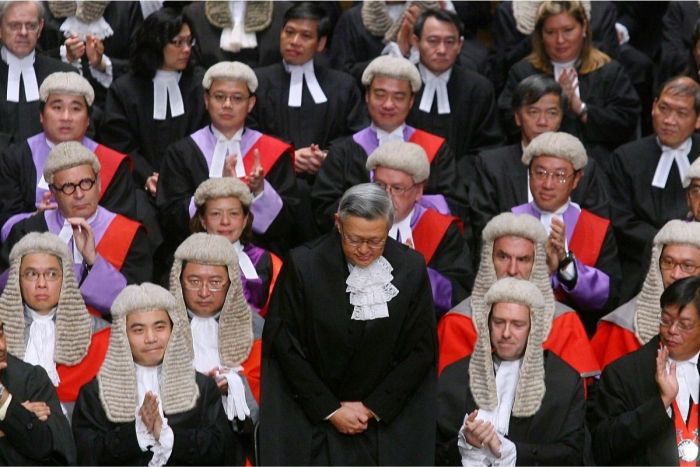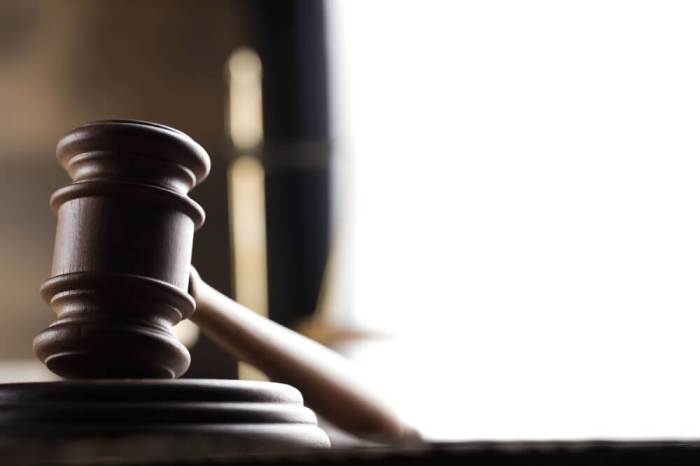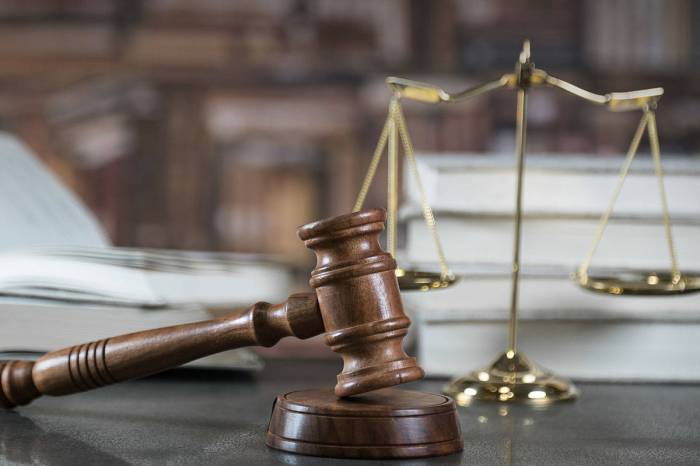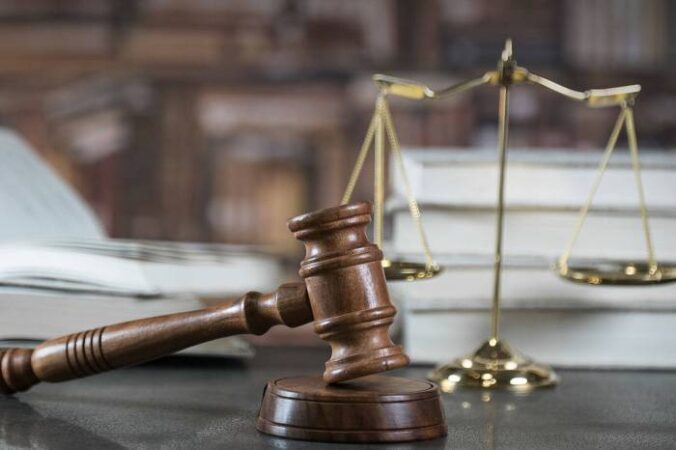
Is it a judge’s duty to uphold the law? This fundamental question lies at the heart of our legal system, shaping the very fabric of justice and societal order. Judges, entrusted with the weighty responsibility of interpreting and applying the law, are often seen as the guardians of fairness and impartiality. But what happens when the law itself is ambiguous or conflicts with societal values? How do judges navigate the complex terrain of legal interpretation and ensure that their decisions reflect the spirit of the law while remaining true to their oath of office?
This exploration delves into the intricate relationship between judges and the law, examining the ethical and moral obligations that guide their decisions. We’ll explore the various sources of law, the concept of legal precedent, and the challenges of interpreting complex legal cases. Through a lens of historical examples and contemporary dilemmas, we’ll gain a deeper understanding of the vital role judges play in upholding the law and ensuring the integrity of our legal system.
The Role of a Judge

Judges play a pivotal role in the administration of justice, serving as impartial arbiters who ensure the fair application of the law. They are entrusted with the weighty responsibility of resolving disputes, interpreting legal principles, and safeguarding individual rights. Their decisions have far-reaching consequences, shaping the lives of individuals and influencing the course of society.
Judicial Independence and Impartiality
Judicial independence and impartiality are cornerstones of a fair and just legal system. These principles guarantee that judges can make decisions based solely on the law and evidence presented before them, free from undue influence or pressure.
- Judicial independence refers to the freedom of judges from external interference in their decision-making process. This includes protection from political influence, threats, or intimidation. It ensures that judges can act without fear of reprisal, upholding the law without bias or favoritism.
- Judicial impartiality requires judges to be unbiased and fair in their rulings. This means avoiding any preconceived notions, personal interests, or conflicts of interest that could compromise their objectivity. Judges are expected to apply the law equally to all parties, regardless of their social status, political affiliations, or personal beliefs.
Examples of Judges Upholding the Law
Throughout history, numerous judges have exemplified the ideal of upholding the law with integrity and courage. Their decisions have shaped legal principles, protected individual rights, and left an enduring legacy on the legal landscape.
- Justice Thurgood Marshall, the first African American Supreme Court Justice, was a tireless advocate for civil rights and equality. His dissenting opinion in the landmark case of *Brown v. Board of Education* challenged the legal basis for racial segregation in schools, paving the way for a more just and equitable society.
- Lord Denning, a renowned English judge, was known for his innovative and progressive rulings. He championed the rights of individuals against powerful institutions, advocating for fairness and justice in a rapidly changing world. His landmark decisions in cases such as *Donoghue v Stevenson* and *Bernstein v Skyviews & General Ltd* established important legal principles that continue to shape the law today.
The Nature of Law
The law is a complex and multifaceted system of rules and principles that govern human behavior. It provides a framework for social order, resolving disputes, and protecting individual rights. To understand the role of a judge, it’s essential to grasp the diverse sources and interpretations of the law that shape their decisions.
Sources of Law
Law originates from various sources, each contributing to the legal landscape. The primary sources of law are:
- Statutes: These are laws enacted by legislative bodies, such as Congress at the federal level or state legislatures. Statutes address a wide range of issues, including criminal offenses, civil rights, and environmental regulations. For example, the Clean Air Act is a federal statute that regulates air pollution.
- Common Law: This is a body of law developed through judicial decisions, also known as case law. When courts resolve disputes, their decisions establish legal precedents that serve as binding guidelines for future cases involving similar issues. The concept of stare decisis, meaning “to stand by things decided,” emphasizes the importance of adhering to precedents. For instance, the landmark case of Brown v. Board of Education (1954) established the principle of racial equality in public education, influencing subsequent cases concerning school desegregation.
- Constitutional Law: The Constitution of the United States is the supreme law of the land, outlining the fundamental principles and structure of the government. It also guarantees certain rights to citizens, such as freedom of speech, religion, and the press. Constitutional law encompasses the interpretation and application of the Constitution by courts, shaping the legal framework of the nation. The Supreme Court’s decision in Marbury v. Madison (1803) established the principle of judicial review, empowering the court to review laws and determine their constitutionality.
Legal Precedent and its Influence on Judicial Decisions
Legal precedent, also known as stare decisis, plays a crucial role in the judicial system. It ensures consistency and predictability in the application of the law. When a court faces a new case, it examines previous decisions on similar issues to guide its ruling.
“Stare decisis is a legal doctrine that obligates courts to follow historical rulings in similar cases.”
This practice promotes fairness and prevents arbitrary decisions. However, it’s not an absolute rule. Courts may deviate from precedent if they believe it’s outdated, unjust, or inapplicable to the current circumstances.
Interpretations of the Law
Interpreting the law is an essential part of a judge’s role. Different judges may approach the same legal text with varying perspectives, leading to diverse interpretations. These interpretations can be influenced by factors such as:
- Judicial Philosophy: Judges may hold different philosophical views on the role of the law and the judiciary, shaping their approach to interpretation. Some judges might favor a strict interpretation of the law, adhering closely to the text, while others might adopt a more flexible approach, considering broader societal values and the intent behind the law.
- Context and Facts: The specific facts of a case and the historical, social, and political context in which it arises can significantly influence a judge’s interpretation. For example, a judge interpreting a law regarding free speech might consider the specific type of speech in question and the potential harm it might cause.
- Personal Values: While judges are expected to be impartial, their personal values and beliefs may subtly influence their interpretation of the law. It’s crucial for judges to be aware of their own biases and strive for objectivity in their decisions.
The varying interpretations of the law can have significant implications for judicial rulings. Different interpretations can lead to conflicting decisions in similar cases, highlighting the complexity of the legal system.
The Judge’s Duty to Uphold the Law

Judges play a crucial role in upholding the law and ensuring justice prevails. They are entrusted with the responsibility of interpreting and applying the law fairly and impartially, upholding the rule of law and safeguarding the rights of all individuals. This duty is not merely a legal obligation but also a fundamental ethical and moral commitment.
Ethical and Moral Obligations of a Judge, Is it a judge’s duty to uphold the law
Judges are bound by a set of ethical and moral principles that guide their conduct and decision-making. These principles emphasize impartiality, fairness, integrity, and accountability.
- Impartiality: Judges must be impartial and unbiased in their decisions, avoiding any personal biases or prejudices that could influence their judgment. This principle requires judges to treat all parties equally, regardless of their social status, race, gender, or other personal characteristics.
- Fairness: Fairness requires judges to ensure that all parties have a fair opportunity to present their case and be heard. This includes providing equal access to legal representation, allowing sufficient time for evidence presentation, and ensuring that the proceedings are conducted in a fair and transparent manner.
- Integrity: Integrity demands that judges maintain the highest standards of honesty and ethical conduct. They must be truthful in their dealings, avoid conflicts of interest, and refrain from engaging in any behavior that could undermine public trust in the judiciary.
- Accountability: Judges are accountable for their decisions and actions. This means they are subject to scrutiny and review by higher courts, disciplinary bodies, and the public. Accountability ensures that judges are held responsible for any misconduct or breaches of ethical standards.
The Challenge of Interpretation
The application of law is rarely straightforward. Laws are written in general terms, aiming to cover a wide range of situations, but specific cases often present unique circumstances that require judges to interpret the law’s meaning and application. This interpretation process is crucial as it determines the outcome of individual cases and shapes the evolution of legal principles.
Examples of Complex Interpretation
The interpretation of law can be complex and controversial, leading to different interpretations and outcomes in similar cases. This complexity arises from the inherent ambiguity in language, the evolving nature of society, and the interplay between different legal principles. Here are some examples:
- Brown v. Board of Education (1954): This landmark case challenged the “separate but equal” doctrine established in Plessy v. Ferguson (1896). The Supreme Court, interpreting the Fourteenth Amendment, ruled that racial segregation in public schools was unconstitutional. This interpretation overturned a long-standing legal precedent and significantly impacted the interpretation of equality and civil rights in the United States.
- Roe v. Wade (1973): This case involved the right to abortion, which was not explicitly mentioned in the Constitution. The Supreme Court, interpreting the right to privacy implied in the Fourteenth Amendment, ruled that states could not ban abortion in the first trimester of pregnancy. This decision sparked ongoing debate and legal challenges, highlighting the complexity of interpreting constitutional rights in the context of evolving social values.
- Obergefell v. Hodges (2015): This case involved the right to same-sex marriage. The Supreme Court, interpreting the Fourteenth Amendment’s Equal Protection Clause and Due Process Clause, ruled that states could not deny same-sex couples the right to marry. This decision further exemplified the evolving interpretation of constitutional rights in the face of changing social norms and values.
Factors Considered in Interpretation
Judges consider various factors when interpreting the law. These factors aim to ensure that the law is applied fairly and consistently, while also taking into account the context of the case and the evolving needs of society. Some of the key factors include:
- Legislative Intent: Judges often attempt to understand the intention of the legislature when drafting the law. They examine legislative history, including debates, committee reports, and the law’s purpose. This helps them interpret the law’s meaning in light of its intended application.
- Social Context: Judges recognize that society is constantly evolving, and laws must adapt to these changes. They consider the social context of the case, including prevailing societal values, norms, and technological advancements. This allows them to apply the law in a way that is relevant to the present circumstances.
- Precedent: Judges rely heavily on previous court decisions (precedent) to guide their interpretations. This principle of stare decisis promotes consistency and predictability in the application of law. However, judges may distinguish cases or overrule precedent when the facts or social context warrant a different outcome.
- Plain Meaning Rule: Judges often start by examining the plain meaning of the words used in the law. This approach assumes that the law’s meaning is clear and unambiguous. However, if the language is unclear or ambiguous, judges may resort to other interpretive tools.
Hypothetical Scenario
Imagine a hypothetical scenario where a new law prohibits the use of drones for commercial purposes within city limits. However, the law does not explicitly define “commercial purposes.” A local business owner uses a drone to deliver packages within the city. The city authorities issue a cease-and-desist order, arguing that the drone delivery constitutes a commercial purpose. The business owner challenges the order, arguing that their delivery service is not commercial in nature.
The judge in this case faces a difficult decision. They must interpret the law’s meaning of “commercial purposes” and apply it to the specific facts of the case. They will consider factors such as the legislative intent behind the law, the social context of drone delivery services, and relevant precedents. The judge’s interpretation will determine the outcome of the case and could have implications for future cases involving drone use within the city.
Closing Notes

Ultimately, the question of whether it’s a judge’s duty to uphold the law is a complex one, with no easy answers. While judges are bound by their oaths and the principles of judicial independence, they must also grapple with the nuances of legal interpretation and the evolving social landscape. Their decisions, however, have a profound impact on individuals, communities, and the very foundation of our society. As we navigate the challenges of a changing world, it’s more important than ever to understand the role of judges in upholding the law and ensuring a fair and just legal system for all.
FAQ Overview: Is It A Judge’s Duty To Uphold The Law
What are the different types of legal systems?
There are two main types of legal systems: common law and civil law. Common law systems, like those in the United States and the United Kingdom, rely on judicial precedents and legal interpretations. Civil law systems, prevalent in Europe and many parts of the world, are based on codified laws and statutes.
What is the difference between a judge and a lawyer?
Judges are appointed or elected officials who preside over court proceedings and make legal decisions. Lawyers, on the other hand, are legal professionals who represent clients in legal matters and provide legal advice.
Can a judge overturn a law?
In some jurisdictions, judges have the power of judicial review, which allows them to overturn laws deemed unconstitutional or incompatible with the fundamental principles of the legal system.





